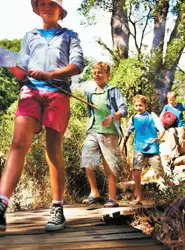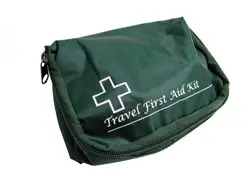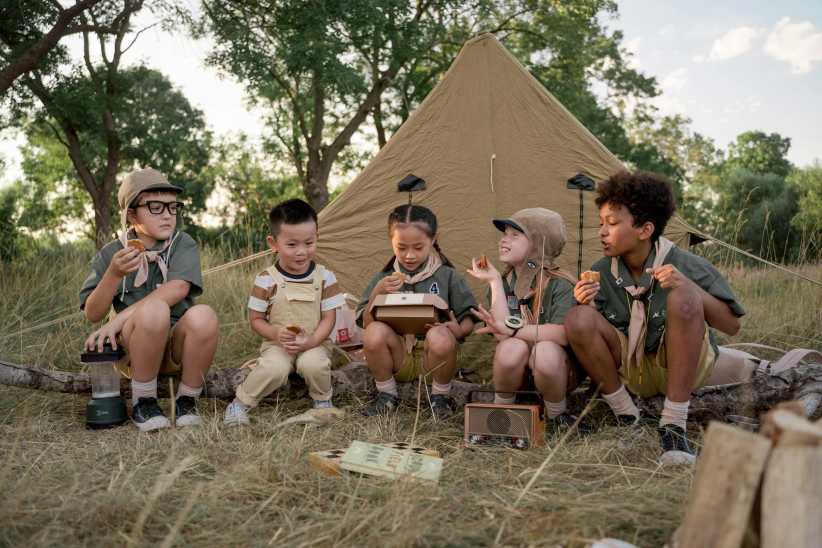
Summer may be six months away, but now is the time to start thinking about – and planning for – camp. Whether it’s your child’s first time or your camper is returning for another exciting season, there are still tons of questions and concerns that come up year after year. So to help you navigate the process and ensure that your child has a memorable experience, we consulted top experts from area camps to find out their answers to the most common questions parents pose each season.
Homesickness
Going to a new place for the first time can be intimidating even for the most outgoing child, which is why one of the most common concerns parents have is how a camp handles a child who comes down with a case of homesickness. “Camps are very well versed in dealing with homesickness and the best thing they can do is to keep children happy, engaged, and busy,” says Sean Nienow, director of the National Camp Association, who adds that some camps have skilled staff members whose main responsibility is to ensure that children make an easy transition. Going to day camp can also be a source of tension for young children who have never been in a school setting or for those who are shy or uncomfortable in new environments. “Coming to camp for the first time and the overall transition can make it or break it for the whole summer,” says Josh Male, director of Gate Hill Day Camp in Stony Point, NY.

Bites, Scrapes, and Stomachaches
The New York State Department of Health requires all camps to have physicians or nurses available as well as an approved health director and medical plan. And each camp has its own specific policies and systems about when to call parents if a child isn’t feeling well. “We try not to call with bug bites, bumps, and bangs, but when children tell us they’re not feeling well and if they are looking a little under the weather, we call parents to let them know. We don’t replace the parent so we must work with them for the well being and safety of their child,” says Katha Cato, director of Camp Henry at the Henry Street Settlement in Manhattan. “If a child has a fever or does not seem to be healthy, the nurse will call. The nurse also calls home to mention scrapes, bruises, and other concerns,” says Gary Bloom, owner and director of Camp Playland, which has two locations in New Canaan and Redding, CT. In 2009, the H1N1 flu was the biggest health concern on the minds of parents and the C.D.C. issued recommendations specifically for camps to recognize and prevent the spread of the virus. “Camps had to adjust their intake process by asking children if they were feeling sick and also talking to parents and making them feel comfortable that all the precautions were being taken,” Nienow says.
Safety
Keeping children safe is always the first priority for camps, whether it’s in the pool, on a day trip, or in the cabins. “Every camp is going to have a different policy about who they hire and what kind of training is required of them,” says Nienow. He adds that most counselors are college students or have a college education. Many camps revise their policies and systems each year to ensure a safe camp experience.
Barbara Schainma n and her husband, Steve, run Camp Mohawk, a day camp in White Plains that offers an optional sleepaway week in the Catskills. “Since 9/11, we have a phone-messaging system which can contact parents on their home, work, and cell phones if an important message needs a speedy delivery, allowing us to contact hundreds of families within minutes,” Schainman says. Camp Mohawk also requires those picking up a child to show an ID card to the staff before the child is released. To make parents feel comfortable, training in CPR is important, says Abe Shampaner, director of The Learning Tree in Middle Village, NY, whose staff includes an EMT.
n and her husband, Steve, run Camp Mohawk, a day camp in White Plains that offers an optional sleepaway week in the Catskills. “Since 9/11, we have a phone-messaging system which can contact parents on their home, work, and cell phones if an important message needs a speedy delivery, allowing us to contact hundreds of families within minutes,” Schainman says. Camp Mohawk also requires those picking up a child to show an ID card to the staff before the child is released. To make parents feel comfortable, training in CPR is important, says Abe Shampaner, director of The Learning Tree in Middle Village, NY, whose staff includes an EMT.
The camp’s counselor-to-student ratio can also ensure safety at all times. For example, New York State requires day camps to have one counselor for every 12 children. “A parent is more prone to believe that a camp that works to provide a safe summer will also work to provide a meaningful and fun summer,” says Rabbi Ilan Weinberg, director of Berkowitz Gan Israel Day Camp in Port Washington, NY.
 Culinary Choices
Culinary Choices
Mealtime can also be a concern if children have specific dietary needs, allergies, restrictions, or if they’re simply picky eaters. “Most camps will try to provide different options for meals and although they may not customize meals for every child, they’re becoming more accommodating for children with allergies,” says Nienow, who adds that camp literature will state if the camp is a nut-free, vegetarian-, or vegan-friendly facility. It’s also best to ask if the camp is safe for children with airborne nut allergies, if it’s not spelled out in the camp’s materials.
Some camps approach the food dilemma by offering a variety of options for children to choose from. At Gate Hill Day Camp, they not only have a meal item of the day, they also offer a full salad bar, a yogurt bar, and a variety of fruits, pastas, bagels, and sandwiches. “If campers are picky, that’s the easiest way for us to solve it,” Male says.
Making Friends
Camp should be a memorable experience and an excellent opportunity for children to make new friends outside of their school environments, but if a child is shy or doesn’t make friends easily, camps take varied approaches to solving this age-old dilemma. At Camp Mohawk, the staff pairs up children for projects a nd encourages campers to help out their introverted peers. “Staff are trained to spot random acts of kindness, reinforce this behavior, and help others learn how and what it means to be a friend,” says Schainman. Downtown Day Camp in Tribeca also trains its staff to identify and foster potential friendships among the children. “We believe that making friends is the most important part of the camp experience, so we teach our staff to focus a lot of attention on children’s interactions with each other,” says the camp’s director, Russ Schulman, Ph.D. At Mill Basin Day Camp in Brooklyn, the camp owner Jack Grosbard says that the staff helps campers feel that everyone is equal and never forces a child to participate in activities if he or she is not comfortable. “Talking to the kids, instructing them, and gently encouraging them to try something new more often than not can get them to give it a try,” he says. “And you know what? Most of them do.”
nd encourages campers to help out their introverted peers. “Staff are trained to spot random acts of kindness, reinforce this behavior, and help others learn how and what it means to be a friend,” says Schainman. Downtown Day Camp in Tribeca also trains its staff to identify and foster potential friendships among the children. “We believe that making friends is the most important part of the camp experience, so we teach our staff to focus a lot of attention on children’s interactions with each other,” says the camp’s director, Russ Schulman, Ph.D. At Mill Basin Day Camp in Brooklyn, the camp owner Jack Grosbard says that the staff helps campers feel that everyone is equal and never forces a child to participate in activities if he or she is not comfortable. “Talking to the kids, instructing them, and gently encouraging them to try something new more often than not can get them to give it a try,” he says. “And you know what? Most of them do.”



















